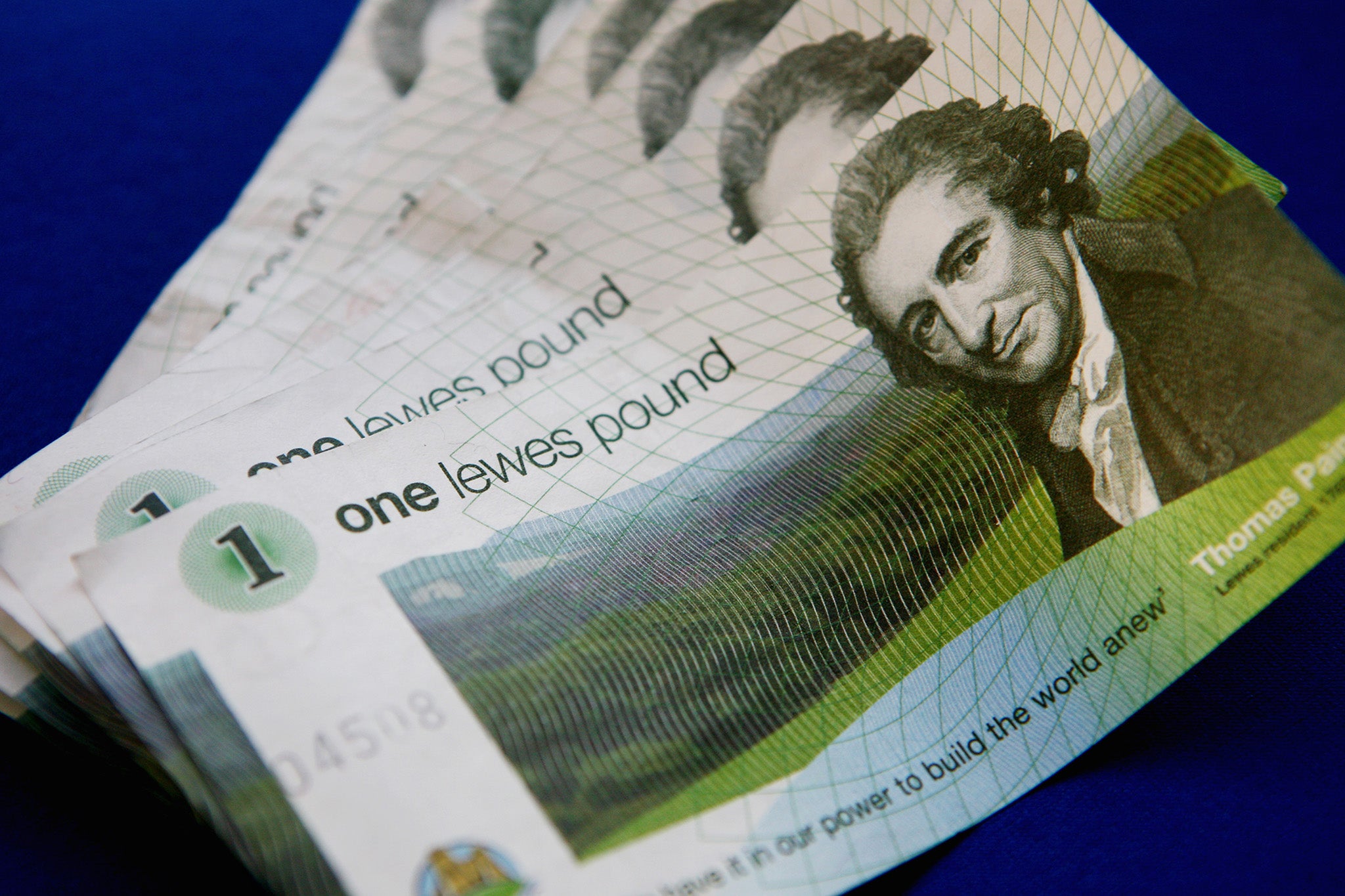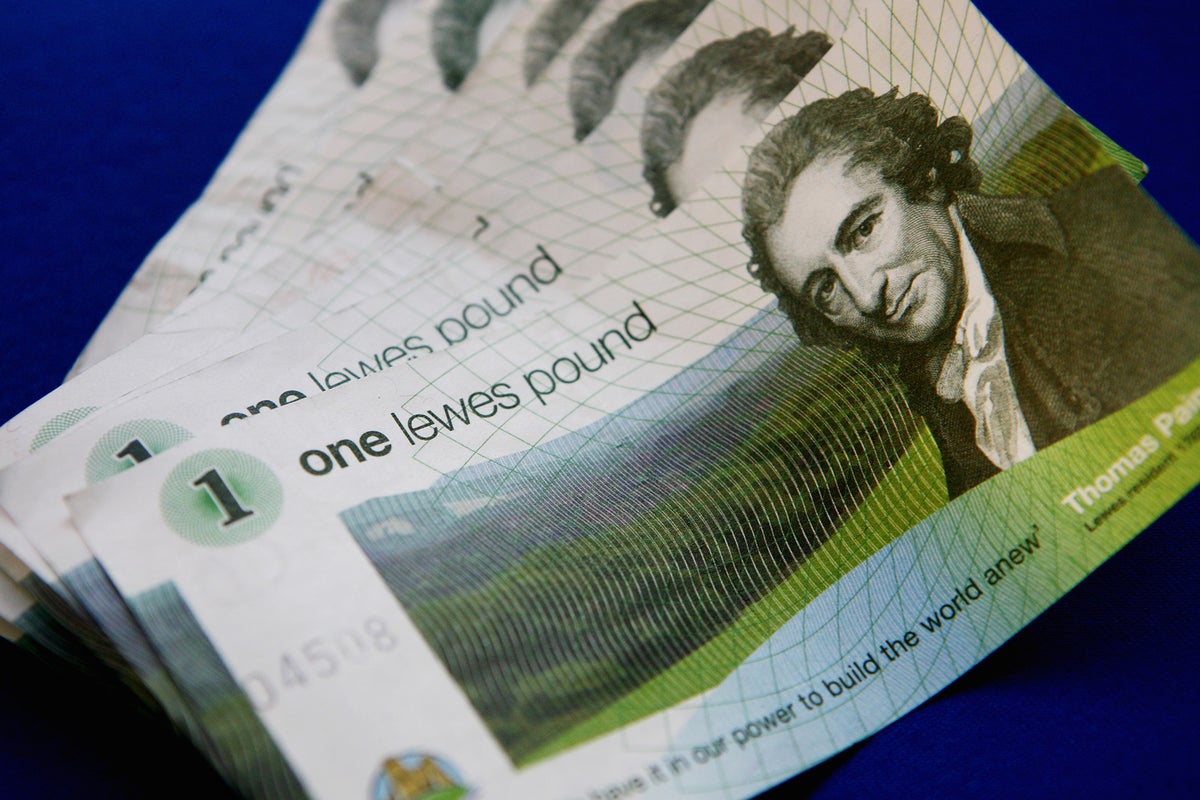Your support helps us to tell the story
From reproductive rights to climate change to Big Tech, The Independent is on the ground when the story is developing. Whether it’s investigating the financials of Elon Musk’s pro-Trump PAC or producing our latest documentary, ‘The A Word’, which shines a light on the American women fighting for reproductive rights, we know how important it is to parse out the facts from the messaging.
At such a critical moment in US history, we need reporters on the ground. Your donation allows us to keep sending journalists to speak to both sides of the story.
The Independent is trusted by Americans across the entire political spectrum. And unlike many other quality news outlets, we choose not to lock Americans out of our reporting and analysis with paywalls. We believe quality journalism should be available to everyone, paid for by those who can afford it.
Your support makes all the difference.Read more
The Lewes Pound – the UK’s final surviving local currency – is being officially discontinued after 16 years of circulation, amid the rise in card and digital payments resulting in lack of demand for cash, including local alternatives.
Sunday 31 August was the last day the currency, which worked like a voucher, was valid in participating shops and businesses in the East Sussex town, marking the end of a bold experiment in community economics.
Launched in 2008 as a response to global financial instability and environmental concerns, the Lewes Pound was designed to encourage support of local business in Lewes. At its peak, over 100 shops accepted the currency, and it became a symbol of grassroots resilience and sustainability.
The notes were available in £5, £10, £20 and £21 denominations and featured philosopher Thomas Paine, as well as local landmarks on the design.
Cash made up around half of UK transactions in 2009, but that had fallen to just a quarter by 2019. The team behind the Lewes Pound cited similarly declining demand amid the rise of digital payments and card transactions, as well as logistical challenges as key reasons for winding down the initiative.
 The Lewes Pound was launched in 2008 to help support local businesses and celebrate the East Sussex town of Lewes (PA)
The Lewes Pound was launched in 2008 to help support local businesses and celebrate the East Sussex town of Lewes (PA)
Susan Murray, a director of the Lewes Pound told The Independent: “The Lewes Pound was a local complimentary currency that was set up to support local independent business in Lewes and to celebrate Lewes and everything that is good about it.
“[It’s demise] is really sad,” she said. “Yesterday was the date the last issue expired, which meant if we wanted to continue we would have needed to go through the whole thing of sorting out designs and printing and security for a new issue. But it wouldn’t be worth doing that for less than five years. We’ve been working on it since 2008, and we’ve kind of run out of steam. We looked really hard to find some people to take it on, but it didn’t prove possible, very sadly.”
She suggested Covid-19 had also played a role in changing people’s relationship with cash and consequently the Lewes Pound. “During the pandemic people I know were using the Lewes Pound regularly would be at the market, using cards, so that’s certainly got something to do with it.”
She said that leftover funds, totalling around £10,000, would be donated to local organisations that “share the philosophy behind the Lewes Pound in the hope that new things will come out of it”.
Paul Resende, landlord of the Lewes Arms, the pub where the currency was launched in 2008, told The Independent: “I do think it’s sad. We were always happy to accept them at the pub, Covid killed it off really as a lot of businesses stopped taking cash and that trend continues.
“We used to be 50:50 cash and card pre-covid, now only about 10 per cent of our sales are paid in cash. Most of the Lewes Pounds we took at the pub were from other small business owners.”
He added: “I never saw one of the fabled £21 notes, mind.”
Previous experiments with local currency have been undertaken in Totnes in Devon, the Lake District, Bristol, Exeter, Stroud, and in Brixton in London, but none of the schemes are currently operational in cash form.
Lewes residents are invited to exchange any remaining notes or keep them as mementos of a unique chapter in British monetary history.

